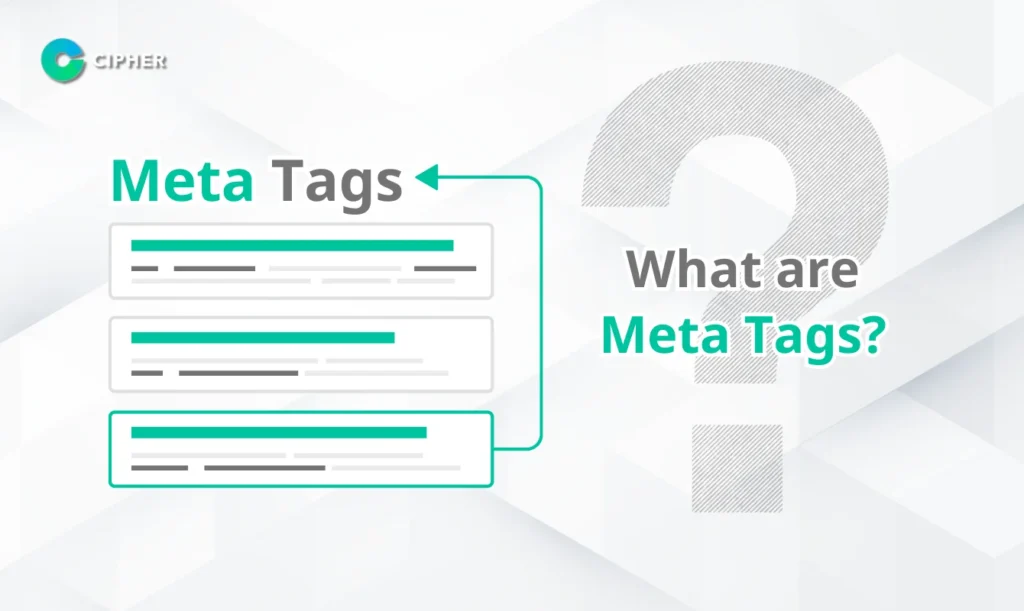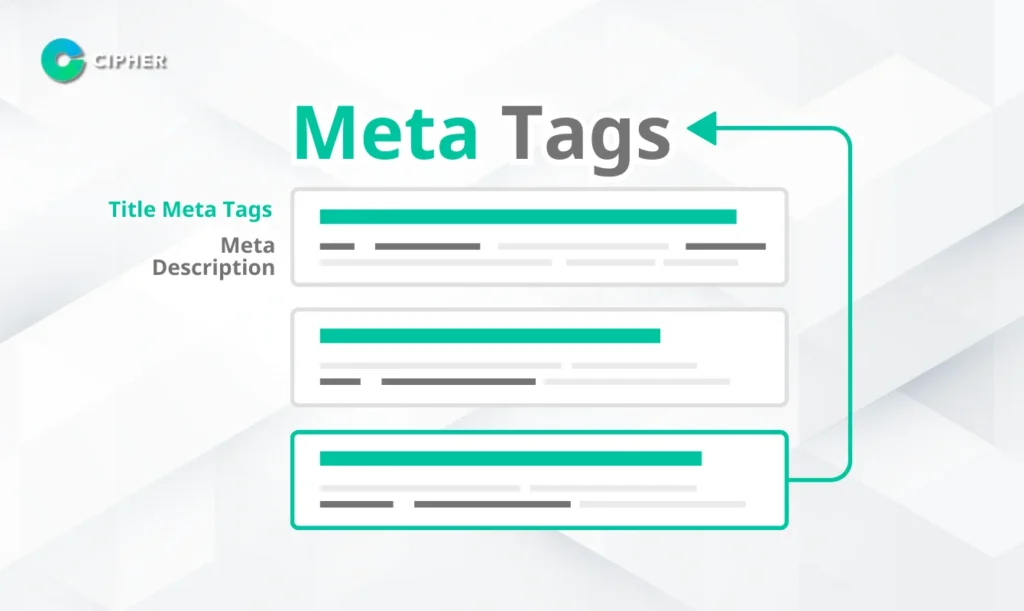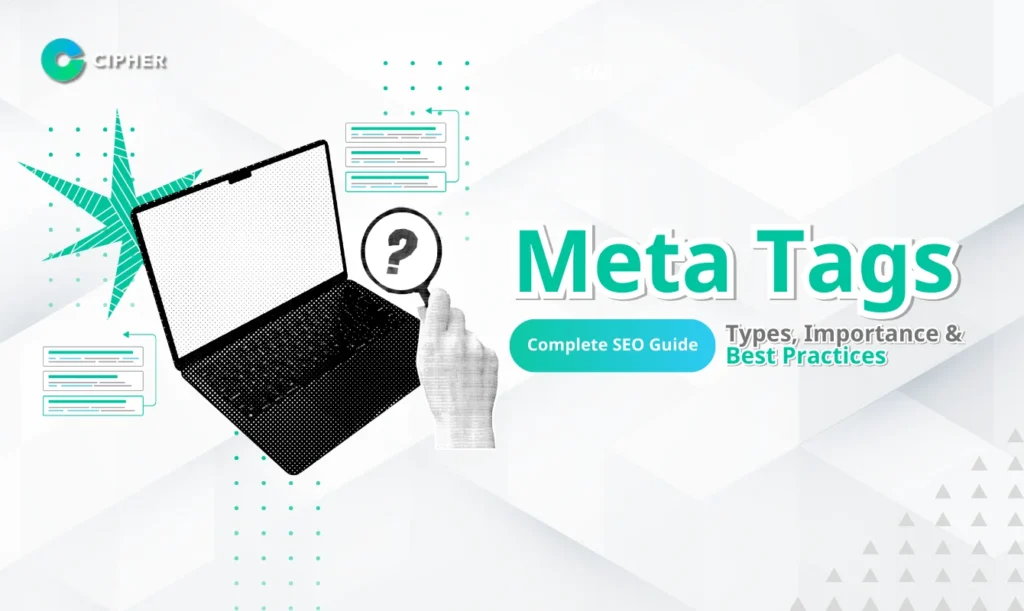Meta Tags represent one of the fundamental pillars of successful search engine optimization, serving as the bridge between your website content and search engine understanding. At Cipher, we recognize that mastering Meta Tags is essential for any digital marketing professional seeking to achieve top search rankings. Our comprehensive SEO services encompass every aspect of Meta Tags optimization, from technical implementation to strategic content creation. This guide explores the critical role Meta Tags play in modern SEO strategies and how proper implementation can dramatically improve your website’s search visibility. Understanding these HTML elements is crucial for anyone serious about dominating search engine results pages.
Table of Contents
What Are Meta Tags?

Meta Tags are specialized HTML elements placed within thesection of web pages that provide essential information about your content to search engines and browsers. Unlike regular content, these tags remain invisible to website visitors but serve as crucial communication tools with search crawlers. When search engines like Google process your pages, they rely heavily on Meta Tags to understand context, relevance, and how your content should be categorized and displayed in search results.
These HTML SEO Meta elements act as digital ambassadors for your content, effectively summarizing what each page contains and why it matters to searchers. Meta Tags Google uses include various types, each serving specific purposes in the overall SEO ecosystem. From defining page titles to describing content summaries, these tags form the foundation of how search engines interpret and rank your website.
Why are Meta Tags Important for SEO?
While Meta Tags may not directly influence search rankings as powerfully as they once did, their impact on user engagement and click-through rates remains substantial. Well-crafted Meta Tags significantly increase the likelihood of users clicking through to your website from search results, which sends positive engagement signals to search algorithms.
Meta Tags Analysis reveals that pages with optimized metadata consistently achieve higher click-through rates compared to those with generic or missing tags. When users encounter compelling titles and descriptions in search results, they’re more likely to visit your site, increasing organic traffic and improving overall SEO performance. Search engines interpret these engagement metrics as quality indicators, potentially boosting your rankings over time.
Furthermore, Meta Tags help search engines understand your content’s context and relevance to specific search queries. This understanding enables more accurate matching between user intent and your content, resulting in better-qualified traffic and improved user satisfaction metrics.
Types of Meta Tags

Title Meta Tags
Title Meta Tags, commonly referred to as title tags, represent the most visible and influential Meta Tags in search results. These elements appear as clickable headlines in search engine results pages and browser tabs, making them crucial for both SEO and user experience. Effective title tags should incorporate your primary keywords while remaining compelling and descriptive.
The optimal length for title tags ranges between 50-60 characters to ensure complete visibility in search results. Each page should feature unique, relevant titles that accurately reflect the content while encouraging clicks. Strategic placement of keywords toward the beginning of title tags can enhance their SEO effectiveness.
Meta Description
Meta descriptions provide concise summaries of page content that appear beneath title tags in search results. While these descriptions don’t directly impact rankings, they significantly influence click-through rates and user engagement. A Meta Tag Generator for SEO can help create optimized descriptions that balance keyword inclusion with compelling copy.
Effective meta descriptions should be approximately 150-160 characters long, include relevant keywords naturally, and feature clear calls-to-action that encourage user engagement. Each page requires unique descriptions that accurately represent the content while enticing users to click through to your website.
Other Important Meta Tags
Beyond title tags and descriptions, several other Meta Tags contribute to comprehensive SEO optimization. Meta Keywords Tag, while less influential than previously, can still provide context to search engines about page relevance. Meta robots tags control crawler behavior, specifying whether pages should be indexed or followed.
Canonical tags address duplicate content issues by designating preferred versions of similar pages. Open Graph and Twitter Card tags optimize social media sharing appearance, extending your reach beyond traditional search results. These specialized Meta Tags work together to create a comprehensive optimization framework for your website.
- Meta Keywords – Used to specify the main keywords of a page. Currently, they have become less important.
- Meta Robots – Used to define the behavior of Search Engine Robots, whether to crawl and index that particular page or not.
- Canonical Tag – Used to specify the main page in cases where there is duplicate content across multiple pages.
- ALT Tag – Used to describe images, helps with ranking in Image Search.
- Open Graph and Twitter Card Meta Tags – Used to control how content appears when links are shared on social media.
Writing these Meta Tags appropriately will help improve the effectiveness of your SEO efforts.
How to Write Meta Tags for Better SEO
Writing Title Meta Tags
Title Meta Tags or Title Tags are among the most important Meta Tags for SEO as they are the first elements displayed on search result pages and are what attract users to click on your website. Therefore, writing good Title Tags is a crucial factor in increasing your click-through rate (CTR). Techniques for writing outstanding and interesting Title Meta Tags are as follows:
- Include the main keyword of the page at the beginning of the Title.
- Keep it at 60 characters or less.
- Ensure it matches the content on the page, no clickbait.
- Make it compelling to click but not clickbait.
- Write a unique title for each page, avoid duplication.
- Add the brand/website name at the end if there is space left.
How to Write Meta Description
Meta Description is another Meta Tag that is just as important as the Title Tag because it provides a summary of the webpage’s content and appears below the Title on Google’s search results page. Writing an interesting and relevant Meta Description will help increase the chances of users clicking through to your website. Guidelines for writing a good Meta Description are as follows:
- Summarize the main points of the page, be concise.
- Keep it no longer than 160 characters.
- Include 1-2 relevant main keywords.
- Be interesting and compelling to attract visitors to the website
- Create unique descriptions for each page, don’t use duplicates
- Include a Call to Action encouraging some action, such as “Read more,” “Sign up,” etc.
How to Write Meta Keywords
In the past, Meta Keywords were Meta Tags that played an important role in SEO. However, today search engines like Google give less weight to Meta Keywords because they have been misused, such as excessive keyword stuffing. Nevertheless, including Meta Keywords related to webpage content is still beneficial in telling search engines what search terms the page is related to. Writing techniques include:
- Only include keywords that are truly relevant to the page content
- Limit the number of keywords to no more than 10 words
- Separate keywords with commas (,)
- Put the most important keywords at the beginning
- Avoid keyword stuffing – don’t just stuff keywords in; they must be relevant to the content
How to Write Meta Robots
Meta Robots are Meta Tags used to control the behavior of Search Engine Robots, determining whether to crawl and index content on a webpage, as well as whether to follow links within the page. Using Meta Robots correctly helps prevent duplicate pages or unwanted pages from being indexed by search engines, which could negatively impact SEO. Guidelines for setting Meta Robots values are as follows:
- Set the value to “index, follow” for pages you want to be crawled and indexed
- Use “noindex” for pages you don’t want to be indexed, such as thank you pages after form submission or search result pages
- Use “nofollow” for links you don’t want to pass Link Juice to, such as links to untrustworthy external websites
How to Write Canonical Tags
Canonical Tags are Meta Tags used to solve duplicate content problems on websites, which search engines dislike because they don’t know which page’s content to index. Therefore, when multiple pages on a website have the same content, you need to tell search engines which URL should be considered the main one – that’s what Canonical Tags are for. The correct way to use Canonical Tags includes:
- Specify the main URL for duplicate content to prevent duplicate content issues
- Use the full URL, including https:// or http://
- Insert in secondary pages with duplicate content, pointing to the main URL you want indexed
- Update the Canonical Tag if the main URL changes
- Use Self-referential Canonical for pages without duplicate content by pointing the URL to itself
Writing Meta Tags correctly and completely for all types will significantly enhance SEO effectiveness.
Cipher's Professional SEO Services
At Cipher, we understand that effective Meta Tags optimization requires expertise, time, and ongoing attention to search algorithm changes. Our comprehensive SEO services include detailed Meta Tags analysis, strategic optimization, and continuous performance monitoring. We utilize advanced Meta Tag Generator for SEO tools combined with human expertise to create compelling, search-optimized metadata for every page on your website.
Conclusion
Meta Tags remain fundamental components of successful SEO strategies, directly impacting search visibility and user engagement across all digital platforms. Cipher’s expert SEO services ensure your Meta Tags are strategically crafted to maximize both search engine understanding and user click-through rates. Our comprehensive approach combines technical expertise with creative copywriting to deliver metadata that drives qualified traffic to your website. Don’t let suboptimal Meta Tags limit your search potential – partner with Cipher today to unlock your website’s full SEO capabilities. Contact us now to begin optimizing your Meta Tags for sustained organic growth and competitive advantage.
Frequently Asked Questions
What Are Meta Tags?
Meta Tags are HTML elements that provide metadata about web pages to search engines and browsers. They include information such as page titles, descriptions, and keywords that help search engines understand and categorize your content. These tags appear in the page’s head section and are not visible to website visitors.
How do Meta Tags impact SEO?
Meta Tags influence SEO in several important ways:
- They help search engines understand page content and context
- Well-written title tags and descriptions increase click-through rates from search results
- They prevent duplicate content issues when properly implemented
They improve the user experience by providing clear, relevant information in search listings
What are the main types of Meta Tags?
The essential Meta Tags for SEO include:
- Title tags – Define page headlines in search results
- Meta descriptions – Provide content summaries below titles
- Meta robots – Control search engine crawling and indexing behavior
- Canonical tags – Specify preferred URLs for duplicate content
- Open Graph tags – Optimize social media sharing appearance
- Alt text for images – Describe images for accessibility and image search
In addition, there are also Meta Keywords, Structured Data, and HTTP Headers that should be further understood to enhance SEO effectiveness even more.





